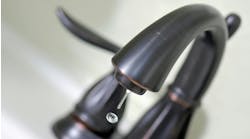BY ROBERT P. MADER
OF CONTRACTOR'S STAFF
SCHAUMBURG, ILL. — The Plumbing Manufacturers Institute is battling proposed California legislation that would ban lead in plumbing products. The proposed 0.25% lead content is so restrictive that no faucet on the market could meet it, PMI said.
For example, proponents of AB1953 claim that faucets made by T&S Brass & Bronze Works and Chicago Faucet, a Geberit Co., could meet the standard. Both firms deny it, however, in letters to the bill's sponsor, Assembly woman-Wilma Chan. Claude Theisen, president of T&S Brass and also president of PMI, noted in a letter to Chan that his company is a leader in using low-lead brass. The firm's faucets, however, contain components made of bar stock that will not meet the standard, he wrote.
Similarly, William Christensen, CEO of Chicago Faucet, said in a letter to Chan that although the firm's 1100-CP faucet has been identified as being lead-free, it contains components made from wrought brass or bar stock that won't meet the standard. He pointed out in his letter that Californians' drinking water is well protected by the NSF 61 standard that's part of the California Plumbing Code.
PMI has created a myth vs. reality chart on AB1953, and is vigorously lobbying assembly members. PMI Executive Director Barb Higgens said that a number of members of the California Assembly, after checking out the myths vs. realities, feel they've been misled by the bill's sponsors.
The first myth, as listed by PMI, is that the bill's formula for determining lead content is effective and understood. PMI said that the formula proposed in an amendment was an attempt to make the arbitrary 0.25% requirement work; the result is an unenforceable and confusing calculation.
The bill's supporters maintain that faucets are the main source of lead in drinking water. In contrast, PMI said that lead levels have been reduced to nearly immeasurable amounts over the past decade due to advancements in materials and manufacturing processes.
This has been confirmed by American Waterworks Association Research Foundation research presented in June in San Antonio, Texas, PMI said. The AWWA Research Foundation study shows faucet lead levels of less than 2 parts per billion. Aging infrastructure, including pipe and plumbing system components, are the main contributors of trace amounts of lead in the water supply, PMI said.
While the bill's proponents state that lead levels in blood remain high, the Centers for Disease Control and Prevention reports blood lead levels have dramatically decreased. In 2005, the CDC reported that 1.6% of children aged 1-5 years had blood lead levels greater than acceptable amounts, which is down nearly 40% from the early 1990s.
PMI rejected the claim that industry backs the bill. Since the bill was introduced, companies and organizations that are directly involved with the manufacture of water distribution components and development of materials for industry have been opposed to it. These groups have continually stated that no foreseeable faucets can comply with AB1953. The lone industry letter not in opposition — from the California Metals Coalition — does not represent the position of its few members involved in potable water devices and appears to be an attempt to negotiate the removal of other member products (irrigation, drain and industrial products) from the bill. PMI said that CMC does not speak for the faucet, valve or meter industries on this issue and has no experience in the design and manufacture of the products affected by this bill.
The CMC Website identifies it as a coalition of 10,000 California-based die casters, foundries, metal formers, metal fabricators, metal smelters, machine shops, metal extruders, heat treaters and powder coaters. Perusal of the organization's membership rosters does not show any firms in the faucet business.
The claim that lead leaching from faucets increases over time has not been substantiated by any study, PMI noted.
The bill's supporters also attack NSF, claiming that NSF 61 is a static standard and is manufacturer driven. On the contrary, PMI noted, NSF 61 is updated one or more times a year and is maintained through a dynamic process involving experts from all stakeholder groups including regulators, academia, health officials, toxicologists and industry stakeholders. NSF 61 committee members include representatives from the California Department of Health Services, Los Angeles Department of Water and Power, AWWA and the U.S. Environmental Protection Agency.
The bill's supporters further claim that NSF 61 does not address corrosiveness of water, which, in fact, it does, said PMI, which pointed out that water in other states, such as Florida, is more corrosive than California water.
Despite the claim that bismuth is an acceptable alternative alloy, PMI said that bismuth-containing brass can only be made into castings and cannot be forged. Faucets contain components made from forged bar stock that's machined into various parts of faucets. Bismuth alloys are limited in use and application due to limitations in manufacturing, durability, strength and ability to apply surface finishes, PMI said.
Central Brass' Richard A. Chandler said in a letter to Chan that bismuth is too brittle to use for all components of a faucet and that his firm's stem assemblies and seats have a nominal lead content of 2.5% to 3.7%. Also, Central Brass uses forgings with a lead content from 1.5% to 2.5%.
Higgens said that a vote by the full Assembly on the bill is expected in mid-August.

